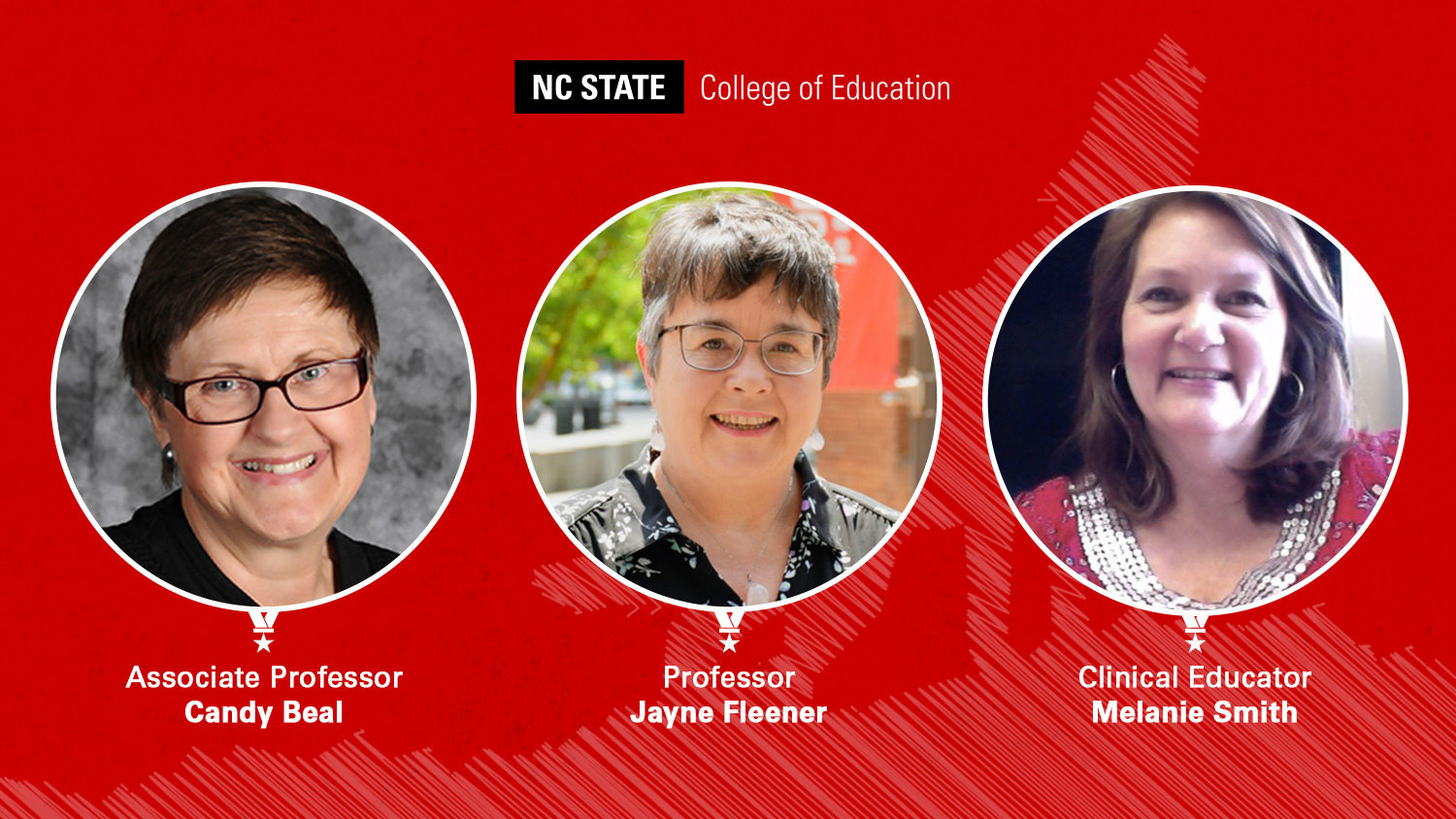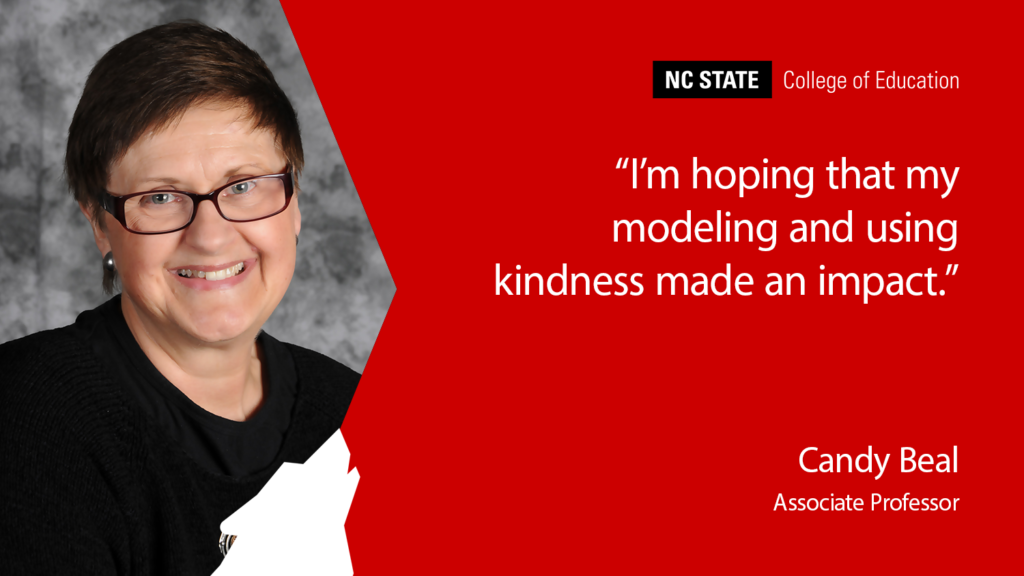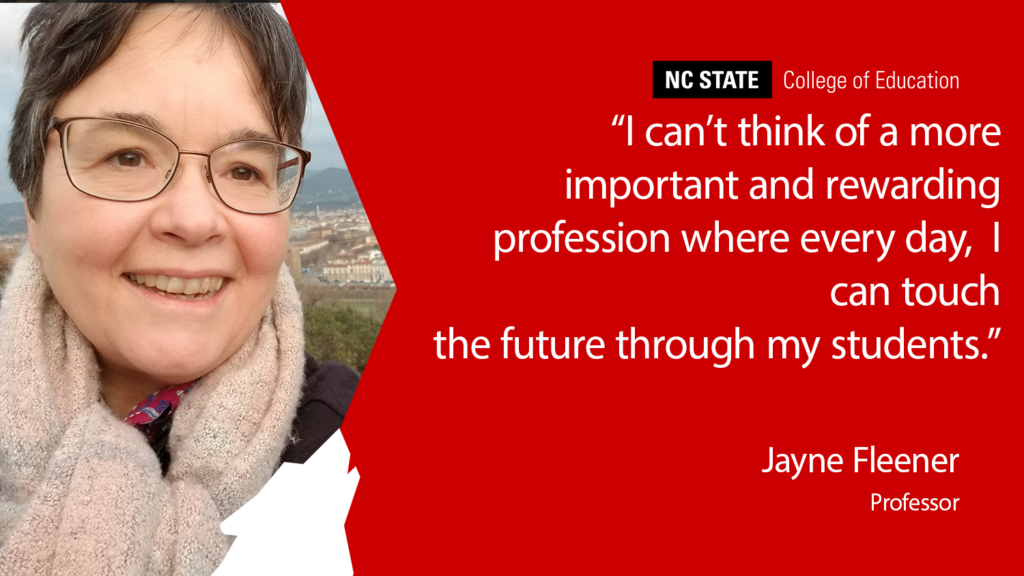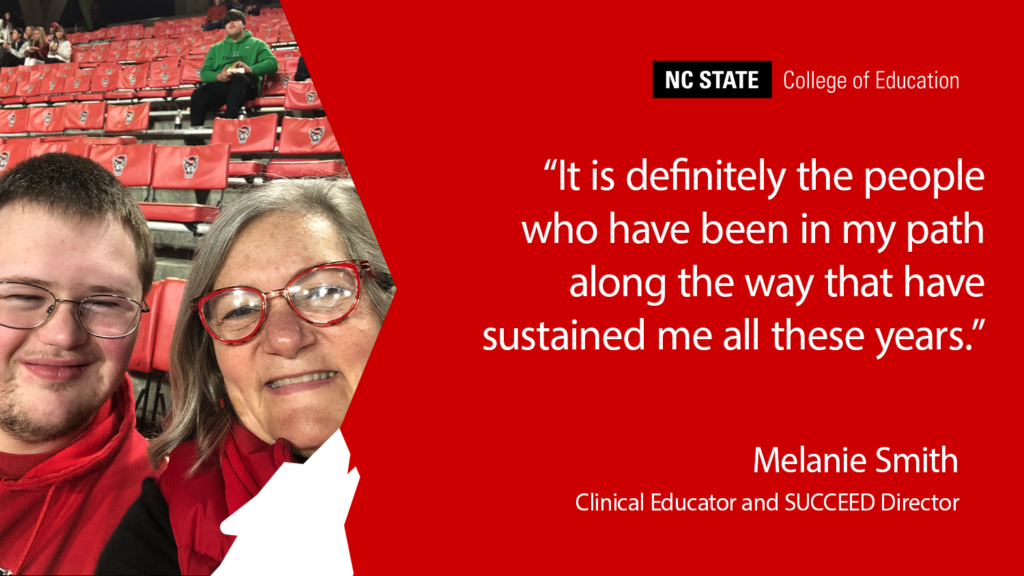Associate Professor Candy Beal, Professor Jayne Fleener and Clinical Educator Melanie Smith Reflect on Their Time in the College of Education Ahead of Retirement

Three faculty members will be retiring from the NC State College of Education at the end of the Fall 2023 semester:
- Candy Beal, associate professor of middle grades and social studies education, will retire after 27 years with the college
- Jayne Fleener, professor of adult and continuing education and a former dean of the college, will retire after 13 years with the college
- Melanie Smith, clinical educator and SUCCEED managing director, will retire after 20 years with the college.
You can read more about why they stuck with a career in education, their favorite memories from the College of Education and what they are looking forward to in retirement below:
The following interviews have been edited for length and clarity.
Associate Professor Candy Beal

Why did you initially choose a career in education?
In 1968, you could either be the nurse, the secretary or the teacher. I was not particularly good at science, or I would have gone on to be a doctor, which is what I really wanted to be, so I got a doctorate instead. I had no interest in being a secretary, and I always really liked helping kids.
In the 1950s, they were trying to find some new way to teach other than phonics, so they did what was called the Look/Say approach, and all that means is you look at the word, and you say it because you’ve memorized it. But they never taught any phonics and so a whole group of kids, including myself, grew up reading disabled. That kind of followed me all through school. My dad was in the Air Force, so we moved around a lot. We moved around so much that nobody ever caught [that I was struggling to read], but I had enough time to make friends in my classes and kids would change my answers when we exchanged papers. There was one boy who would always fix my spelling for me.
It wasn’t really until fourth or fifth grade that I started reading Nancy Drew books, and those are high interest, low vocabulary. So, Nancy Drew books taught me how to read, and I’ve always loved volunteering with kids and helping kids learn how to read. In my third year of teaching, I decided I needed a master’s in reading because I wasn’t really able to teach social studies as well if I didn’t know how to teach reading.
What inspired you to stick with education for so many years?
I’ve taught four-year-old kids to college, and I’ve loved every single group that I’ve ever taught. I stuck with middle school, I think, because we lived in Oslo, Norway, when I was in middle school, and I was taught in an old, German war barrack, and it was great because my teacher would get everything done in the morning and then we would go out and play baseball or go skiing. So, for me, middle school was a fabulous experience.
I went to William & Mary for my undergraduate degree, I got my master’s at Duke, and I did my doctorate at NC State. By far, NC State was the best education that I had. There is no question about it. The program that I got into was outstanding. It had John Arnold at the head, who was one of the founders of middle grades education, and I also had Dr. Carol Pope, who was on the faculty here, and she was one of the best teachers I’ve ever worked with as a colleague. I had really good people who modeled what you need to do, and I had them as professors and, when I was hired at NC State, I had them as colleagues.
What fond moments from your career really stand out to you?
When I taught in Saratoga, New York, I taught fifth and sixth grade. My husband is a circus historian, and there was a small circus that was going to be set up, so I just took my whole class, and we helped them set up. We all went up there on a Saturday morning, and we helped with the tent and everything, so that was a really cool experience.
One of the things we did here at NC State was to bring a Russian choir to North Carolina, and that was done through a partnership with the College of Education and the Environmental Protection Agency [because my husband worked there and was working on a project related to Russia]. My husband and I raised about $60,000 and were able to bring over 30 children and the choir director. They performed at Stewart Theatre and then we took them over to Winston-Salem, where they did a community performance and visited Winston-Salem University.
I’ve also taken about four trips with our students to Russia, where they did observing and teaching in the classroom, and I did an early exchange with students in Russia and students in the middle school here called the ee-pals. The big project was North Carolina Sixth Graders Go to Russia, and that was 5,000 kids and their teachers, and there were people on three continents who participated. It was virtual except for about 17 of us who actually went to Russia. I wrote a postcard on behalf of Russian students every week, and it would tell about Russia and ask a question for students to research for the next time. Then they could come up with questions for our team to take over to Russia to ask Russian people for us to send back. So, the teachers taught a unit on Russia while we were gone for about two weeks, and we would send back answers. The point of it was to show that you can do curriculum integration when you teach, and it all came from one of my [NC State] students asking me to show them a curriculum integration project.
Then there was TOP, with Dr. Carol Pope, and we worked with students at Centennial Magnet Middle School reading The Outsiders. The kids had read the book, and we talked about different issues. We had a really gifted doctoral student who worked with us and, as he walked around listening to different things, he composed three songs and laid down the tracks. The kids then took the songs and did music videos to them. It was so much better than just reading the book and answering questions; it was very successful, and we did it for 10 years.
The last big project was called the Wetlands Project. A kid came to school with an issue about his grandmother whose house had a wetland on one side and a road on the other so, whenever it rained, runoff from the road and the wetland flooding caused homes to flood. I thought this was a social justice issue and the kids were very invested in it, so we learned about the science of the wetlands; we took the kids on buses and went to the wetland area, and they did a matrix to figure out how many tires and baby buggies had been pulled out with trash from the wetlands, and we took a bus another time and planted native plants. For language arts, we had kids interviewing people who lived in the homes and then they wrote letters to the city council. It was a perfect curriculum integration.
What have been some of your favorite memories from your time in the College of Education?
I brought an idea called Help Yourself, Yourself (HYY) back from a group I saw in Russia [where students without access to a counselor met weekly to discuss their home and school issues]. That group gave me the idea that when I teach development theory to students, because the courses that I taught would be about how to know middle school kids and who they are and why the act the way they do. It occurred to me that it’s great to have teachers know development theories and how to use them to teach and build curriculum, but why don’t we teach these to the kids? I did a five-year study with my graduate students who were teachers and we found that students [in HYY] make better academic progress; they were better behaved; they knew each other better and they were able to appreciate why some kids were good at one thing and not good at another, so they had a little more patience. So, HYY was a huge thing.
The Raleigh Trolly is always a favorite memory. I take my students every semester for two hours on the Great Raleigh Trolly Adventure and, at that point we know the kids; we know the development theories; we know how to work with them and how to develop curriculum and this is how to know where they come from and their heritage. We do the Raleigh Trolly Adventure, and we always end at Krispy Kreme
How do you believe your work in education has made an impact on your students/the field?
When I started teaching, everybody was advised, “Don’t smile until Christmas.” We were supposed to be stern and be very firm, and I’ve never believed in that. In my classes, I have modeled what I believe are best practices. Even on Zoom, we did a thing called Circle of Grace. Everybody would come in; it was a three-hour class, and everybody would come in and just talk for 45 minutes. They would come on, and I would ask, “How are you doing?” and “What’s your week been like?” and then we started and everybody would talk a little about their week. So, I’m hoping that my modeling and using kindness made an impact. I do my best to recognize who my students are and allow them to do the best they can do.
What are you most looking forward to in retirement?
I’ve got a couple of things I want to write, these silly stories, and they all end with something that talks about teaching. I paint, and I’ve got an oil painting that I started 50 years ago that I need to finish. I love to do yard work, and I love to travel.
Professor Jayne Fleener

Why did you initially choose a career in education?
My parents were both educators, and I come from a long line of ministers, so education is sort of the family business. Although I had no intention of going into education, I received a scholarship to pursue my Master of Arts in Teaching in mathematics and found I really loved teaching. Every career move I made, from the classroom to higher education to administration, and back to the classroom, I felt enhanced or enlarged my potential to make a difference in my students’ lives.
What inspired you to stick with education for so many years?
I can’t think of a more important and rewarding profession where every day, I can touch the future through my students. I continue to be inspired by and in awe of my students and how they navigate this world.
Are there any fond moments from your career that really stand out to you?
Recently, as I was clearing out my office and compiling a list of books that I hope to give away, I had a very pleasant trip down memory lane through the meandering of my intellectual pursuits represented by the many different books and subjects I have read and pursued. At each transition point, from classroom teacher, to teacher educator, to university administrator, to adult educator and futurist, I have been open to possibilities. It is those openings, the adventures that unfolded, and the people I met along the way, that I remember fondly.
What have been some of your favorite memories from your time in the College of Education?
As an educator, my highest points have been with students and colleagues. I am fortunate that I was able to end my career back in the classroom, working with students and colleagues. One joint memory that stands out also has to do with Poe Hall. I remember my first day as dean doing a “walk about” the building. There were very few people in the building that day in July. And my last time in the building was on the Sunday before Thanksgiving, as I was emptying out my office of my personal belongings. I did another walk-about of the building. And it was empty. What gives life to Poe Hall isn’t the building, but the people. It was that energy that I was seeking and will miss.
How do you believe your work in education has made an impact on your students or the field?
Recently, I received a call from the son-in-law of one of my doctoral students who had died. He told me he called because he knew how much I meant to the student. As educators, at any level, we don’t always know of our lasting impact, but occasionally we are reminded that we made a difference in someone’s life. I think the best we can do is to always try to do better by our students, to always have their best interests at heart, and to hope we made a difference in their lives.
What are you most looking forward to in retirement?
I’ve told several people, in answer to this question when asked, that professors never retire, we only quit getting a paycheck. I will continue to write and teach, and I already have several projects I’m working on with others. While my family would like it if I slowed down, I am actually hoping my scholarship will accelerate during retirement.
Clinical Educator and SUCCEED Director Melanie Smith

Why did you initially choose a career in education?
When I came to NC State as an undergrad, my major was chemical engineering. I realized in my junior year that it wasn’t for me. Thankfully, I had some trusted advisors who helped me find my way to where I truly belonged, which was in the field of education.
What inspired you to stick with education for so many years?
It is definitely the people who have been in my path along the way that have sustained me all these years. From my 13 years as a second grade teacher through my 20 years in the College of Education, I have been energized and inspired by the powerful connections I have felt with the students, colleagues and community partners with whom I have had the privilege of working.
Are there any fond moments from your career that really stand out to you?
There are many positive moments, but overall, it is having the opportunity to pay forward all the support that I received from mentors and colleagues early in my career as an educator.
What have been some of your favorite memories from your time in the College of Education?
There are many. Some of the highlights include opportunities to collaborate with my colleagues on a variety of projects for teachers across the career span such as Cooperating Teacher Institutes and Beginning Teacher Institutes and the North Carolina New Teacher Support Program. I will also treasure the time working with my graduate students in Instructional Coaching and Mentoring for teachers and engaging with our pre-service teachers during their student teaching seminars.
How do you believe your work in education has made an impact on your students or the field?
In her book, Becoming, Michelle Obama says, “For me, becoming isn’t about arriving somewhere or achieving a certain aim. I see it instead as forward motion, a means of evolving, a way to reach continuously toward a better self. The journey doesn’t end. Do we settle for the world as it is, or do we work for the world as it should be?”
My biggest hope is that my students are out there supporting each other and their colleagues in “becoming” their best selves and working together for the world as it should be.
What are you most looking forward to in retirement?
I have two adorable grandchildren that I look forward to chasing around as well as some plans for travel and other hobbies. And Sunday nights — knowing that I don’t have to wake up for work on Monday!
- Categories:


